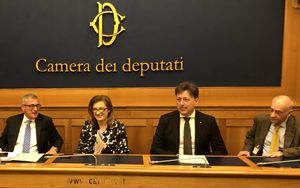(Finance) – “The creation of fiscal peace has nothing to do with an amnesty or winking at tax evaders but is, on the contrary, an indispensable measure for obtaining three important results: clarifying the warehouse of between collectable, uncollectable and even toxic credits, i.e. to collect them the State spends more than it would cash in; helping families and businesses to honor debts with the tax authorities making them sustainable; facilitating the recovery of precious liquidity for State coffers by clearly bringing out the difference between those who cannot pay the files because they are in difficulty, who must be helped, and the total tax evaders who must be prosecuted and convicted”. He stated it Annarita Patriarca (Fi), secretary of the presidency of the Chamber of Deputiesduring the press conference on the theme “Fiscal peace and the new reform of tax justice” promoted byNational Association of Chartered Accountants, with the help of Ciro Di Pietro (chief restructuring officer), which took place at the press room of Montecitorio.
“The impact of the fiscal peace greatly lightens the tax commissions together with the other measures envisaged in the reform with the professionalisation of tax magistrates and with their numerical reinforcement equal to three times the number of judges currently in service which will contribute to reducing the time of justice The task of politics – continued Patriarca – is to accompany this process by guaranteeing personnel, resources and means to the new tax judges to prevent this historic transition from being nullified in the end by structural deficiencies”.
The strategic role of professionals in this reform process was underlined Mario Michelino (national president of Andoc): “Accountants have a key role in guiding companies to identify the best possible solutions offered by the decree on fiscal peace. In fact, around 12 measures are envisaged for small and medium-sized companies that need our support to identify which of these to implement This will be valid for the recalculation of the sanctions, for the request for the information prospectus with the definition of which roles and loads will be scrapped and the definition of the tax disputes with the assessment of the losing party, percentages of the expense remission. it concerns the items to be included in the financial statements which must be correctly recognized in the accounts, reporting them in the explanatory note of the various excerpts which will arrive thanks to the facilitated settlement”.
He focused on the relationship between fiscal peace and the reform of tax litigation Fulvio Baldi (deputy attorney general at the Supreme Court of Cassation): “There are several connections. Some of which are already in place at European level, such as the testimonial reform. In Italy we have gone even further by introducing the remote process, the conciliation on the postponement of the judge or by inserting a series of innovations such as the judge monocratic. In the eighties we had 3 million pending and tax proceedings, now we are around 223,000. The situation can be further improved with fiscal peace. Some critical issues remain for some restrictive interpretations of the MEF which should be revised in an incentive way so as not to whip the reform”. Enrico Moscati (extraordinary professor of Private Law at the Nicolò Cusano University) expressed his opinion on the novelties of the reform: “The fact that the tax judge is a professional judge essentially also makes him independent from the executive power, therefore I fully agree. Also due to the importance of the subject of tax law which has long since ceased to be an appendix of the science of finance and requires the government by a career judiciary”.
The meeting was attended, among others, by the accountant Roberto Ronzoni Marescalchi, the lawyers Amedeo Di Pietro, Danilo D’Andrea, Alberto Mario Moio and Francesco de Luca.
